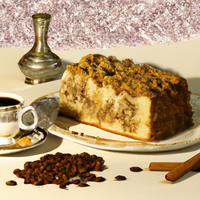
1 serving (100 grams) contains 350 calories, 5.0 grams of protein, 15.0 grams of fat, and 50.0 grams of carbohydrates.

Log this food in SnapCalorie

Nutrition Information
Calories |
833.3 | ||
|---|---|---|---|
% Daily Value* |
|||
| Total Fat | 35.7 g | 45% | |
| Saturated Fat | 11.9 g | 59% | |
| Polyunsaturated Fat | 0 g | ||
| Cholesterol | 71.4 mg | 23% | |
| Sodium | 714.3 mg | 31% | |
| Total Carbohydrates | 119.0 g | 43% | |
| Dietary Fiber | 2.4 g | 8% | |
| Sugars | 59.5 g | ||
| protein | 11.9 g | 23% | |
| Vitamin D | 0 mcg | 0% | |
| Calcium | 119.0 mg | 9% | |
| Iron | 3.6 mg | 20% | |
| Potassium | 238.1 mg | 5% | |
* Percent Daily Values are based on a 2,000 calorie diet. Your daily values may be higher or lower depending on your calorie needs.
Food Attributes
Source of Calories
About Cornell coffee cake
Cornell Coffee Cake is a uniquely crafted treat developed as part of a nutrition science project at Cornell University during the mid-20th century. This cake incorporates soy flour and nonfat dry milk, making it a protein-enriched alternative to traditional coffee cakes. The recipe includes typical ingredients such as all-purpose flour, sugar, eggs, butter, and baking powder, along with its nutritious additions, blending classic dessert flavors with a nutritional boost. Originating from American cuisine, it reflects efforts to create healthier baked goods without compromising taste. While its enhanced protein content and moderate use of fat cater to balanced diets, the cake still contains added sugar and butter, which should be consumed in moderation. Cornell Coffee Cake is ideal for those seeking a healthier approach to indulgence, bridging the gap between satisfying desserts and mindful eating practices.



